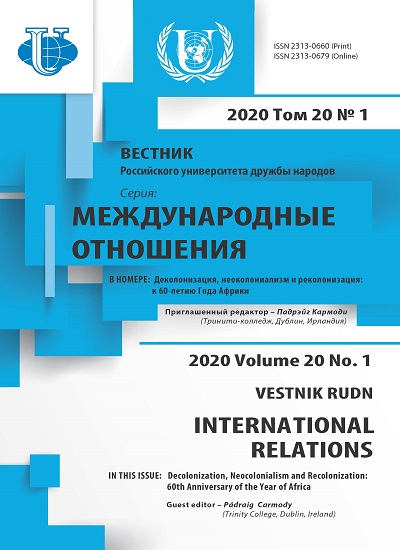Nigeria - South Africa Rivalry in Quest for Regional Power Status: from Material Potential to UN Security Council Membership
- Authors: Omoruyi I.1, Idahosa S.O.2, Mugadam M.M.2, Sidibe O.2
-
Affiliations:
- University of Benin
- RUDN University
- Issue: Vol 20, No 1 (2020): Decolonization, Neocolonialism and Recolonization: 60th Anniversary of the Year of Africa
- Pages: 147-157
- Section: PEACE AND SECURITY
- URL: https://journals.rudn.ru/international-relations/article/view/23328
- DOI: https://doi.org/10.22363/2313-0660-2020-20-1-147-157
- ID: 23328
Cite item
Full Text
Abstract
Keywords
About the authors
Ikponmwonsa Omoruyi
University of Benin
Email: ikponmwonsa.omoruyi@uniben.edu
Professor, Department of International Law, Faculty of Law Benin City, Nigeria
Stephen Osaherumwen Idahosa
RUDN University
Email: idahosa8@gmail.com
Postgraduate Student, Department of Theory and History of International Relations Moscow, Russian Federation
Mahamat Mugadam Mugadam
RUDN University
Email: mmougadammahamat@gmail.com
Postgraduate Student, Department of Political Analysis and Management Moscow, Russian Federation
Oumar Sidibe
RUDN University
Email: omersidibe@gmail.com
Postgraduate Student, Department of Theory and History of International Relations Moscow, Russian Federation
References
- Abegunrin, O. (2009). Africa in Global Politics in the Twenty-First Century. A Pan-African Perspective. New York: Palgrave Macmillan
- Adebajo, A. (2008). Hegemony on A Shoestring: Nigeria’s Post-Cold War Foreign Policy. In: Adebajo, A. & Mustapha, A.R. (Eds.). Gulliver’s Troubles: Nigeria’s Foreign Policy after the Cold War. Kwazulu-Natal: University of Kwazulu-Natal
- Akpotor, A.S. & Agbebaku, P.E. (2010). The United Nations Reforms and Nigeria’s Quest for a Permanent Seat. Journal of Social Science, 24 (01), 51-55. doi: 10.1080/09718923.2010.11892836
- Alden, C. & Le Pere, G. (2009). South Africa in Africa: Bound to Lead? Politikon, 36 (01), 145-169. doi: 10.1080/02589340903155443
- Alden, C. & Schoeman, M. (2015). South Africa’s Symbolic Hegemony in Africa. International Politics, 52 (02), 239-254. doi: 10.1057/ip.2014.47
- Amos, S. (2010). The Role of South Africa in SADC Regional Integration: The Making or Breaking the Organization. Journal of International Commercial Law and Technology, 5 (06), 124-130.
- Bellamy, A.J. & Williams, P.D. (Eds). (2013). Providing Peacekeepers. The Politics, Challenges, and Future of United Nations Peacekeeping Contributions. Oxford: Oxford University Press.
- Börzel, T. & Risse, T. (Eds.). (2016). The Oxford Handbook of Comparative Regionalism. Oxford: Oxford University Press.
- Buzan, B. & Waever, O. (2003). Regions and Powers: The Structure of International Security. Cambridge: Cambridge University Press. doi: 10.1017/CBO9780511491252
- Degterev, D.A. (2020). Evaluation of Current Balance of Power at the International Arena and Formation of a Multipolar World. Moscow: RuScience publ. (In Russian).
- Kayaoglu, T. (2015). The Organization of Islamic Cooperation: Politics, Problems, and Potential. London: Routledge. doi: 10.4324/9781315751467
- Maseng, J.O. (2013). Integrating Africa and the Politics of Inclusion and Exclusion in the Process of UNSC Reform. Conflict Trends, 4, 19-25.
- Maseng, J.O. & Lekaba, F.G. (2014). United Nations Security Council Reform and the Dilemmas of African Continental Integration. African Security Review, 23 (04), 395-404. doi: 10.1080/10246029.2014.948896
- Miti, K. (2012). South Africa and Conflict Resolution in Africa: From Mandela to Zuma. Southern African Peace and Security Studies, 1 (01), 26-42.
- Neumann, I. (Eds.). (1992). Regional Great Powers in International Politics. New York: St. Martin’s.
- Nolte, D. (2010). How to Compare Regional Powers: Analytical Concepts and Research Topics. Review of International Studies, 36, 881-901. doi: 10.1017/S026021051000135X
- Odubajo, T. & Akinboye, S. (2017). Nigeria and South Africa: Collaboration or competition? South African Journal of International Affairs, 24 (01), 61-77. doi: 10.1080/10220461.2017.1314224
- Ogunnubi, O. & Tella, O. (2017). Framing South Africa’s Soft Power through Non-State Sources. Strategic Analysis, 41 (05), 478-495. doi: 10.1080/09700161.2017.1343228
- Omo-Ogbebor, O.D. & Sanusi, H.A. (2017). Asymmetry of Ecowas Integration Process: Contribution of Regional Hegemon and Small Country. Vestnik RUDN. International Relations, 17 (01), 59-73. doi: 10.22363/2313-0660-2017-17-1-59-73
- Prys, M. (2010). Hegemony, Domination, Detachment: Differences in Regional Powerhood. International Studies Review, 12 (04), 479-504. doi: 10.1111/j.1468-2486.2010.00957.x
- Raimi, A.L. (2016). The Reform and Democratization of the Security Council of the United Nations: The Viability of Nigeria’s Quest for a Permanent Seat in the Council. International Journal of Humanities and Social Science, 6 (11), 313-321
- Söderbaum, F. & Shaw T. (Eds). (2003). Theories of New Regionalism: A Palgrave Reader. New York: Palgrave Macmillan
- Tella, O. (2018). Space as a Fulcrum of Nigeria’s External Relations and Regional Hegemony. Space Policy, 46 (01), 1-7. doi: 10.1016/j.spacepol.2018.05.001
- Tella, O. (2019). Nigeria - South Africa Relations and Regional Hegemonic Competence. Berlin: Springer Nature. doi: 10.1007/978-3-030-00081-3
Supplementary files










